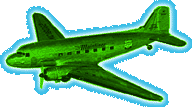

Jammed into a seat in the economy class of an airbus, greedily sucking on
sticky free coke and nibbling stale peanuts, with someone's elbow lodged
in your ribs, you would probably think it ludicrous that Americans once believed
flight would carry us to utopia.
Utopia. Not just an opportunity to fly to the coast for a sales meeting.
But Utopia,
defined in Webster's Collegiate, as "a place of ideal perfection."
During the technology craze of the early 20th Century, no invention held more
mystical or spiritual promise for Americans than the airplane. There was
something about separating from the earth that inspired a belief that flying
was holy, or at least closer to the deity. After all, God was present in
the heavens. A plane brought you into the heavens. Therefore, you were
closer to God.
 Historian Joseph Corn called it "The Prophetic
Creed of Flight" in his 1983 book, The Winged Gospel.
Corn quotes writer Mary Parker in a 1910 article describing
a flight over Chicago: "Not a man but felt that this was
the beginning of such a mighty era that no tongue could tell its
import, and those who gazed felt awestruck, as though they had torn aside
the veil of the future and looked into the very Holy of Holies...".
Historian Joseph Corn called it "The Prophetic
Creed of Flight" in his 1983 book, The Winged Gospel.
Corn quotes writer Mary Parker in a 1910 article describing
a flight over Chicago: "Not a man but felt that this was
the beginning of such a mighty era that no tongue could tell its
import, and those who gazed felt awestruck, as though they had torn aside
the veil of the future and looked into the very Holy of Holies...".
Evangelists even traveled the country preaching on the airplane and
its relationship to God. Some believed that if you waited long enough, the
airplane would eventually turn you into a sort of god. Alfred
Lawson, an eccentric former baseball player, claimed in a 1916 book that
within 8,000 years, a race of "Alti-men" would live in the heavens.
Alti-men would be ethereal and would "swim" and farm in the skies.
Alti-man's counterpart, "Ground-man" would live "at the bottom of the
atmospheric sea like a crab or an oyster."
Lawson also believed, according to Corn, that time spent in the air
was healing. Other commentators foresaw the use of airborne hospitals
"where the sick and the suffering will be carried and nursed back to
health," Corn wrote.

The most repeated, yet unfulfilled prediction of the era was that
everyone would own a personal airplane. Alexander Graham Bell himself
predicted in 1909 that the age of the aircar was just around the corner. A
typical promotion for the personal plane promised "an airplane in every
garage." Terms were invented like "roadable," [describing a plane that
could be converted to a car] and "personal heliocopter." The "Airphibian"
[a plane/auto] made it into the trial stage. As late as 1951, Popular
Mechanics published a cover depicting a helicopter in a family's
garage. Planners even devised gigantic urban terminals for solo air
commuters.
The design of mass transportation aircraft was equally fantastic.
These resembled airborne ocean liners, with massive propellers and balloons
to carry them aloft. One such machine-- Norman Bel Geddes' 1929
boomerang-shaped Transoceanic Passenger Plane-- would have carried 451
passengers, in addition to a crew of 155, including nine bar stewards,
seven musicians, a nurse, and a masseuse.
The reality of air travel, of course, was entirely different, but
then, people had been screwing up predictions about human flight for
hundreds of years. Beginning with Leonardo Da Vinci in 1500 and stretching
through 1890, thinkers and engineers believed a flying machine would mimic
the motions of a bird, down to the flapping wings.

Even Orville and Wilbur Wright, the inventors of the airplane, had
trouble predicting the future of flight. Orville maintained in 1917--
despite three years of raging dogfights in Europe-- that flight would
ultimately make wars impossible.
This view was shared by Octave Chanute, a railroad engineer with a
mystical view of flight who aided the Wrights in their efforts. Chanute
wrote in 1894 that he hoped "the advent of a successful flying machine"
would hasten "the era in which there shall be nothing but peace and good
will among all men."
Chanute also maintained that planes wouldn't be "efficient in
attacks on hostile ships and fortifications," nor could they be relied on
to "drop explosives with great accuracy." The ultimate effect of flight,
Chanute claimed, would be to "diminish greatly the frequency of wars and to
substitute some more rational methods of settling international
misunderstandings."
Despite that lofty hope, airplanes became carriers of the most
lethal killing tools ever devised. See: Dresden; Hiroshima; Vietnam;
Bagdhad.
These days, you hear people making a lot of the same predictions
about cyberspace as those made about the airplane. It's the birth of a new
world. It'll bring people together. It'll bring world peace.
Even: it'll
bring you closer to God.
Well, at least no one's jamming an elbow in your ribs.



 Historian Joseph Corn called it "The Prophetic
Creed of Flight" in his 1983 book, The Winged Gospel.
Corn quotes writer Mary Parker in a 1910 article describing
a flight over Chicago: "Not a man but felt that this was
the beginning of such a mighty era that no tongue could tell its
import, and those who gazed felt awestruck, as though they had torn aside
the veil of the future and looked into the very Holy of Holies...".
Historian Joseph Corn called it "The Prophetic
Creed of Flight" in his 1983 book, The Winged Gospel.
Corn quotes writer Mary Parker in a 1910 article describing
a flight over Chicago: "Not a man but felt that this was
the beginning of such a mighty era that no tongue could tell its
import, and those who gazed felt awestruck, as though they had torn aside
the veil of the future and looked into the very Holy of Holies...".




